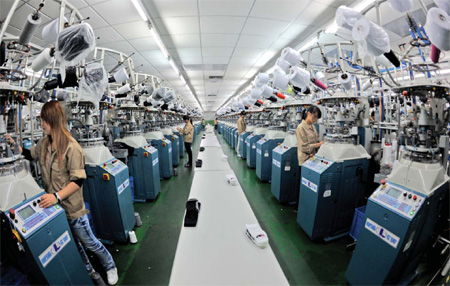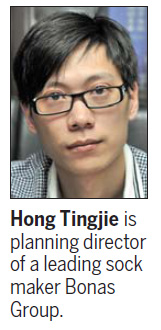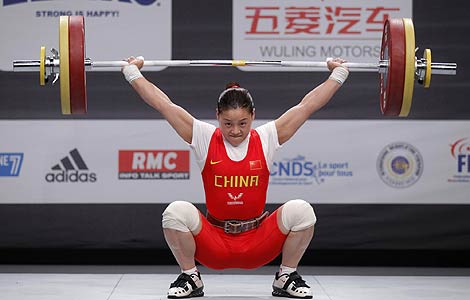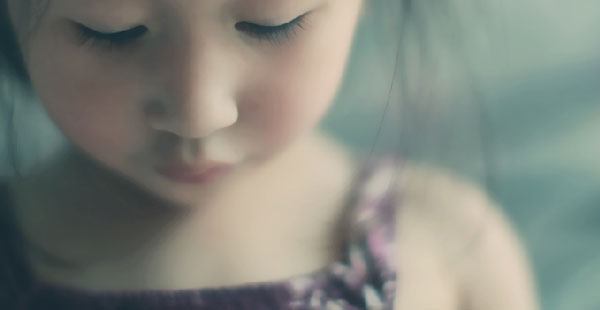Finding the right fit
Updated: 2011-11-11 09:05
By Yan Yiqi (China Daily European Edition)
|
|||||||||
|
Yiwu, the sock capital of China, has more than 1,000 sock companies, and some of them, including Langsha and Bonas, have established their own brands. [Photos by Zhang Jiancheng / for China Daily] |
|
|
Yiwu sock makers turn to brand building as OEM starts losing its shine
After years of basking in the limelight as a leading original equipment manufacturer (OEM) for global sock brands, Yiwu, a city in Zhejiang province, is moving up the value chain by focusing on building strong brands, rather than boosting exports. The predominantly export-oriented city in eastern China, also known as the socks capital, used to supply more than 3 billion pairs of socks for big global retailers such as Walmart, Pringles and Disney every year till 2010. But this year things have started to change dramatically. Hong Tingjie, planning director of Bonas Group, a leading socks maker from Yiwu, says his company turned down a large export order from Walmart recently as part of its new strategy. ��That was a large OEM order, but we want to focus on the domestic market with our own brand,�� Hong says. With reported sales of 500 million yuan ($78.75 million, 57 million euros) last year, and the outlook for the current year not so rosy, Bonas decided it was time to move away from being a manufacturer for big brands and retail chains.
High labor and material costs, shrinking export margins and dwindling export orders from major markets like Europe and the US, have made manufacturers realize that it was no longer prudent to put all eggs in the export basket. On the other hand, the companies also realized that in an increasingly crowded and intense marketplace, it was essential to have strong brands to stay afloat.
Yiwu, with an annual production of 8 billion pairs of socks, is also where nearly 80 percent of the over 20 billion made-in-China socks are sold.
"There is a saying that the Guangdong province was the industrial center in China during the 1980s, and in the 1990s it was Zhejiang. While it is still too early to say that Yiwu would occupy the slot in the 21st century, we are confident of the future as we are generating enough global vibes to make it a reality," says Jin Shanfu, secretary-general of Yiwu Socks Industry Association.
More than dwindling export orders, it is rising labor and material costs that have proved daunting for many sock companies in Yiwu.
With just 30 sock machines that were imported from Italy and 40 workers, Dielian Socks is one of the sock factories in Yiwu that still relies on OEM manufacture.
"Self-branding is a good dream, but for a small factory like us, the complicated market structure and huge marketing expenses are unaffordable," says Wu Jianming, general manager of Dielian.
Founded in 2005, Wu's company has been getting orders from foreign customers such as Puma, adidas, Pierre Cardin, and of course, some Eastern European brands that he himself cannot name.
He says the price of cotton, the main material for making socks, has risen 70-80 percent since the beginning of this year. "We had to increase product prices due to higher labor costs and the continuous appreciation of the yuan. But unfortunately, the strategy did not go down well with most of our clients," says Wu.
Jin says business for sock OEM companies this year is more difficult than in 2008.
"Sock prices rose 20 percent after the financial crisis began in 2008, while order numbers grew 15 percent. But this year, the overseas financial circumstances are so complicated that I am afraid we will see a decline in revenue," Jin says.
But amid the gloom, Jin says there has been one bright spot for the industry: the growing number of imported sock machines in Yiwu. There are now more than 1,000 sock companies and factories in Yiwu, with over 80,000 workers and more than 50,000 socks machines imported mostly from Italy and Germany.
"The number of imported machines in Yiwu is growing by 5,000 every year. We are also able to ensure the quality as the imported machines are the best in the business," Jin says.
But a major hindrance for industrial transformation of most OEM companies is the lack of original designs. To get around this problem, Yiwu sock producers have been looking for ways to team up with international fashion designers.
Bonas has set up a fashion workshop for eight designers in Milan, led by Andrea Dal Prato, who has also worked with European brands like Tetra Pak, Wella and Gamma & Bross.
Every season, Prato and his team send Bonas drafts of 200 to 300 new designs of socks for Asian women.
"Four years back, when I first came to Yiwu to participate in the Yiwu International Commodities Fair, Bonas caught my attention, and later, it was recruiting Italian designers in Milan. That was the beginning of our long-time relationship," says Prato.
Prato says he believes his alliance with Bonas will be one of the most significant of his career, and he is more than pleased to design socks for Asians.
In Yiwu, almost all socks companies that have established their own brands have hired at least one fashion designer from the international field, not only for Chinese consumers but for international ones as well.
Every year, Zrinka Wergeland spends three weeks walking along the stalls in the 1.43 million square meter market in Yiwu, searching for the most up-to-date socks. Owning a small shop of no more than 15 square meters in Croatia, her homeland, Wergeland has been mainly selling socks for women, for the past seven years.
She says the socks she buys from Yiwu are well received in Croatia, and her shop sells more than 300 pairs every month.
"They have designs for East European consumers and even exclusive packing," says Wergeland, adding that apart from her three weeks' purchasing in Yiwu, she also needs to restock supplies twice a year.
"For people in my country, Yiwu is more than a famous place for purchasing small commodities. The low price, the large variety and good quality of socks are worth the plane ticket costs for me every year," says Wergeland.
"Yiwu's leading position in the sock industry should be largely attributed to the market platform in the city. For any industry, the market is always of prime importance," Jin says.
However, sock companies are not satisfied with just the market in Yiwu, and are searching for more channels to sell their socks to consumers from more countries. "We are now planning to spend 800,000 yuan to establish a multi-lingual online platform to sell socks," Jin says.
According to Jin, the association has invited all leading sock companies in Yiwu to join this campaign and hopes to invite the best e-commerce experts to operate this platform.
"We will not be dependent on Taobao.com (China's largest e-commerce platform), because we are targeting consumers all over the world, and not just in China," Jin says. The platform is under construction and is expected to be online by the end of next year.
Apart from online sales channels, Yiwu socks may soon find an outlet at the International Small Commodities Mart in Moscow. In June, the Zhejiang Bureau of Commerce approved Yiwu's project to build an international small commodities market in Moscow with an area of more than 80,000 sq m spread over 1,500 stalls.
"Russia, together with other Eastern European countries, have been our largest consumers. With the opening of the market in Moscow, more consumers will get to know about Chinese socks brands," Jin says.
According to China National Textile and Apparel Council, the leading four sock brands from China are all from Yiwu, with Langsha Holdings Group the leading player with a 17 percent market share in China.
Bonas Group, which started off as an OEM manufacturer, has gradually developed its own brands, and now focuses largely on the domestic market, which accounts for over 50 percent of its revenue.
"OEM and export are easier to manage, and the large quantity and the quick rebound of cash are still attracting many companies. But from a long-term perspective, establishing self-run brands, and taking a stable domestic market share will give us the initiative in the industry," Hong says.
Bonas socks can be found in almost all large supermarkets in China, covering more than 5,000 retail terminals. The company also owns more than 50 franchise stores in China, and the figure is expected to reach 200 next year, according to Hong.
Just like Bonas, an increasing number of socks companies in Yiwu have managed to create their own brands.
"Although Yiwu produces the most and best socks in the world, our socks can only be sold for 2 to 3 yuan in the international markets. But the prices of socks from a well-known brand can reach 15 euros as they have the added-value of a brand," says Jia Guinan, director of Yiwu Economic Development Bureau. He says that it is essential for the Yiwu sock companies to build up their own brands so that the added value is not taken away completely by foreign companies.
In 2010, the total sales revenue of the socks industry in Yiwu reached 10.8 billion yuan, which accounted for 40 percent of China's sock industry as a whole. More than $688 million of that came from exports, according to Yiwu Socks Industry Association.
Among more than 1,000 sock companies in Yiwu, 52 realized 200 million yuan of sales revenue in 2010, and totaled 6.7 billion yuan of revenue for the whole industry in Yiwu. These companies have mainly created their own brands.
According to Jin Shanfu, secretary-general of Yiwu Socks Industry Association, almost all sock companies in Yiwu started their business from OEM. "Companies chose that route because it was the easiest and safest way to get orders from foreign clients, and there was no need to worry about anything related to design or marketing.
"But it also meant that companies did not have any say in the international sock market, and even after decades of development our companies were still at the end of the industrial chain," he says.
For many business owners, the major challenge for transformation was the limited land and resources in Yiwu.
"Land is a big problem, because as far as I know, some companies with annual sales revenue of over 100 million yuan even have to rent a piece of land to operate factories. The government is not as supportive as it is to some other industries," Jin says.
Some leading companies have already moved their factories out of Yiwu to Anhui, Jiangsu and Jiangxi provinces.
"Land in Yiwu is so limited and expensive that we have moved our factories to the northern part of Jiangsu province, which is 10 times larger than Yiwu," says Hong of Bonas.
Jia, however, says that the government has its own concerns on land distribution. "Yiwu is a manufacturing center for many industries, and not just socks. Factories are almost everywhere in the city. Of course, we do not want our grown-up sock companies to move out, but we need time to solve this problem."














